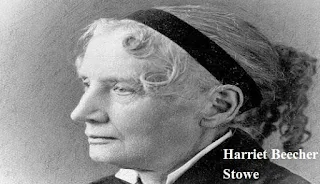• Name: Harriet Elisabeth Beecher Stove.
• Birth: 14 June 1811, Lichfield, Connecticut, United States
• Father: Limon Beecher
• Mum: Roxana.
• Wife / Husband: Kelvin Ellis Stove.
Early life Harriet Beecher Stowe:
Harriet Elizabeth Beecher was born on June 14, 1811 in Lichfield, Connecticut. He was the seventh of the 13 children born to lead Calvinist preacher Liman Beecher His mother was his first wife, Roxana (Futa), a deep religious woman, when Stove was only five years old, then he died. Roxana's grandfather was General Andrew Ward of the Revolutionary War. Among his notable siblings, a sister, Katherine Beecher, who was a teacher and writer, as well as brothers who were ministers included: Henry Ward Beecher, who became a famous preacher and frenzy, Charles Beecher and Edward Beecher.
In 1832, at the age of 21, Harriet Beecher moved to Cincinnati, Ohio to join his father who became president of Lane Theological Seminary. There, he joined the semi-colon club, a literary salon and social club, whose members included Beecher Sisters, Caroline Lee Hentz, Salmon P. Chase (future Governor of the state and Lincoln, Secretary and Secretary of Treasury was included under Emily Blackwell) others included. Cincinnati's business and shipping business on the Ohio River was booming, attracting many migrants from different parts of the country, including many free blacks as well as Irish immigrants who had worked on canals and railroads of the state.
With his interest in literature, Harriet and Kelvin Stove shared a strong faith in elimination. In 1850, Congress passed the Fugitive Das law, indicating crisis and crisis in the abolitionist and free-black communities of the North. Stowey decided to express his feelings through a literary representation of slavery; Josiah base his work on Hansen's life and his own observations. In 1851, Stove's novel, the first installment of Uncle Tom's cabin, appeared in the National Era. Uncle Tom's cabin was published as a book next year and quickly became a best seller.
Stove's emotional depiction of the influence of slavery especially on families and children attracted the attention of the country. Hugged in the answer, the book and its author created hostility in the South. Tollers staged a story-based dramatic performance, in which the characters of Tom, Eva and Toppy got a prestigious position.
Harriet Stove began to write a long story of slavery, which was based on reading his abdiculatory literature and his personal observations in Ohio and Kentucky. Her story was published sequentially (1851-52) in the National Era, Washington, D. C. An antislave paper of; In 1852, this book appeared in the form of Uncle Tom's cabin; Or, life between lowly. The book was an immediate sensation and it was raised with disgusting eagerness, whereas with its author, it was strongly rejected in the south, where reading or keeping a book had become an extremely dangerous enterprise.
With the sale of 300,000 in the first year, the book enhanced the similar effect of some other novels in history, which helps to strengthen supporters and antisocial sentiments. The book was widely translated and, at times, dramatization (for the first time, in 1852, without the permission of Stave), where it was played for audience capacity. Stovy was excited on England's tour in 1853, and there he made friends with many prominent literary figures. In the same year, he published a key in the cabin of Tom, a compilation of documents in support of the disputed description of his mistrust of Das.
Religion had significant influence on his life. He was brought with his father's strict Calvinism, but when he grew up, he followed his path, in which the high-church episcopalanism was involved. After the death of his two sons, he also began to take an interest in spiritualism (the practice of contacting souls that have passed). His Christian religion was very important for his life and writing.
In 1869, Sto again toured Europe, in which Lord Byron's (1788-1824) widow revived the earlier friendship. As a result, the novelist published Lady Byron Windypitted (1870), accusing the dead poet that he violated his marriage pledge by having sex with his sister. Byron was a legend at this time, and as a result of the allegations, Stove suffered a lot of losses to his loyal British audience.
Undisputably, however, he continued his series of novels, poems and sketches, as well as his autobiography, lacking a dedicated and enthusiastic American audience. Later years of stove life in Florida in large part, where he and his husband, with only moderate success, tried to manage their income from literary activities. On July 1, 1896, Stove died in Connecticut's Hartford.
